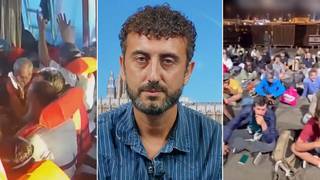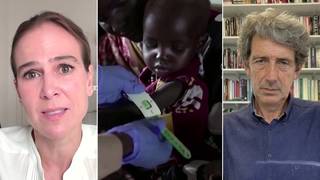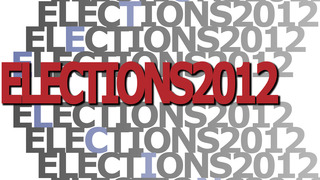
Guests
- Rocky Andersonformer mayor of Salt Lake City, Utah, and the founder and director of High Road for Human Rights.
Tonight’s debate between Republican presidential candidates marks the first national debate appearance of Mitt Romney, former Massachusetts governor. Meanwhile, fellow Mormon and former Utah governor, Jon Huntsman, has yet to announce and will skip the debate. While in Utah last January reporting on the Sundance Film Festival, Democracy Now! spoke with former Salt Lake City Mayor Rocky Anderson about the political record of Hunstman and Romney. The two became “great friends” when they worked together on the 2002 Winter Olympics in New York City.
AMY GOODMAN: You have the top Republican contender for president in 2012, Mitt Romney, from Utah. And a possible opponent—maybe, we’ll see—is President Obama’s ambassador to China. Jon Huntsman, a Republican who he appointed, who speaks fluent Chinese, is talking about possibly running for president. Talk to us about—what is it about Utah?
ROCKY ANDERSON: Well, it’s very conservative in the sense that it’s very status quo-oriented. And it is a culture of obedience, whether it’s religious authority, whether it’s political authority—unless, of course, a Democrat is in power. But it’s a tough place for people who want to see progressive change, except, I must say, within Salt Lake City proper. And Salt Lake City usually has pretty progressive leadership, both in our state legislature. Usually the majority of Salt Lakers vote for the Democratic candidate for president, and we have—
AMY GOODMAN: And this is very interesting, because, I should have said, this is all against, for example, you, having been the mayor of Salt Lake City, fierce critic of President Obama, and it’s also the home of the Mormon Church.
ROCKY ANDERSON: Yeah. Well, Obama and Bush. Bush was in the White House when I was mayor, and we had a lot of opposition to President Bush coming out of Salt Lake City.
AMY GOODMAN: And yet, Mitt Romney endorsed you. You endorsed him.
ROCKY ANDERSON: We did endorse each other. That was before my more vocal opposition to President Bush. But Mitt Romney and I actually worked very closely around the Olympics. I got to know him—the former Mitt Romney, I must say. The Mitt Romney that ran for and served as governor of Massachusetts was a very different Mitt Romney than has been running for president of the United States.
AMY GOODMAN: Well, tell us about that Mitt Romney, the Mitt Romney that was and that is.
ROCKY ANDERSON: Well, I think the real Mitt Romney, the Mitt Romney we all knew and who served as governor of Massachusetts, was very reasonable, very moderate. He felt that Roe v. Wade should be the end of the debate on choice, supporter of stem cell research. He was not the right-winger that he seemed to be when he decided that he would run for president of the United States. And frankly, I’d like to see the old Mitt Romney come back, because I think that he’s the sort of people that could bring people together and not be so fiercely partisan.
AMY GOODMAN: When did he change?
ROCKY ANDERSON: The day that he decided to run for president of the United States. Jon Huntsman, Jr., our former governor, I’ve known him for years. Again, far more reasonable and moderate than, for instance, the leadership in the Utah state legislature. And he was very well regarded, I think, by most Democrats as well as Republicans in the state of Utah.
AMY GOODMAN: And how did he end up being President Obama’s ambassador to China?
ROCKY ANDERSON: Well, you know, a lot of people say that President Obama sent him to China to take him out of the running. I don’t think that’s—
AMY GOODMAN: For president against him.
ROCKY ANDERSON: Exactly. I think that President Obama picked Governor Huntsman, because Governor Huntsman had had a lot of diplomatic experience, in Singapore as United States trade representative. He speaks Mandarin Chinese fluently, is very bright, very worldly. I think he was a terrific choice for ambassador to China.
AMY GOODMAN: And what about as president of the United States?
ROCKY ANDERSON: Well, if he didn’t take the kind of turn that Mitt Romney took—and I don’t think that Jon Huntsman, Jr. would do that, frankly—he’s somebody that I think could help get beyond this fierce, very nasty partisanship that we see today.
AMY GOODMAN: And if he did jump into the presidential pool of Republican candidates, what would this mean for Mitt Romney? Both Utah Mormons.
ROCKY ANDERSON: It would, I think, certainly split the Mormon community. That’s where a lot of the money is coming from in Mitt Romney’s race. I think that it would be a hugely complicating factor for Mitt Romney. But Mitt Romney right now, as I understand, is the leading Republican contender. I think that he’s worked very, very hard at this. I think he’s been running constantly, since he first announced during—before the last election. And in either case, I think we’d be seeing somebody that’s very bright, very capable. But what I want to see is somebody who’s very principled and that will not let partisanship overcome principle.
AMY GOODMAN: Just one more question on Governor Huntsman. His father was also governor of Utah?
ROCKY ANDERSON: No, no. His father was founder of Huntsman Chemical Company, which was, until fairly recently, a privately owned, family-owned chemical company.
AMY GOODMAN: And why did Governor Huntsman, the ambassador to Chinese—why did he learn Chinese? Why was he fluent in Chinese?
ROCKY ANDERSON: Because of his Mormon mission. That’s—I think you see more foreign languages spoken in Utah than any state in the country, and it’s because so many foreign missions are served by LDS church members.











Media Options